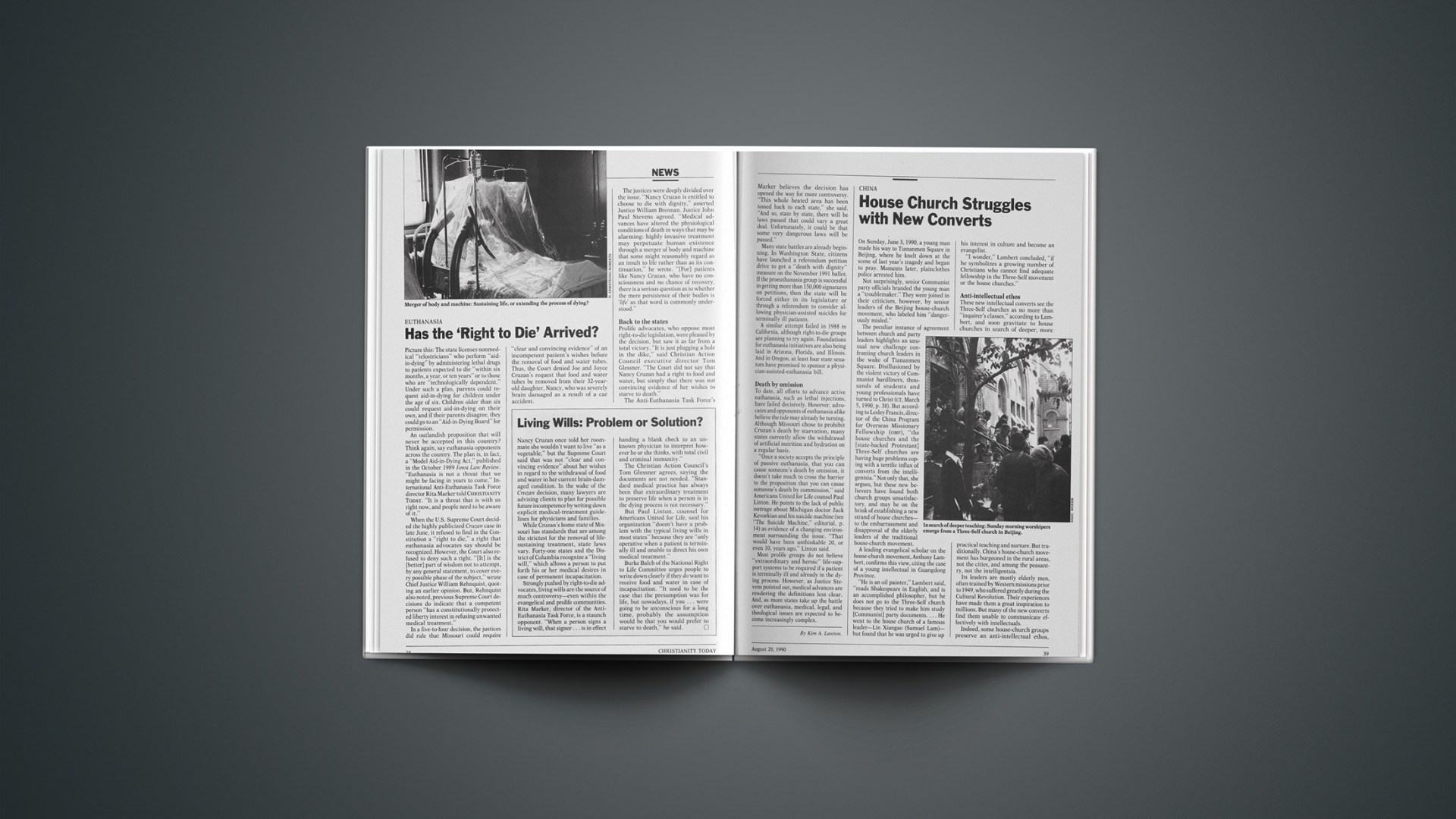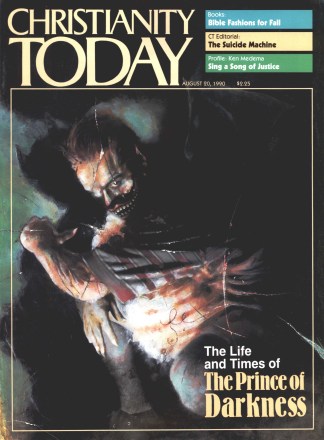On Sunday, June 3, 1990, a young man made his way to Tiananmen Square in Beijing, where he knelt down at the scene of last year’s tragedy and began to pray. Moments later, plainclothes police arrested him.
Not surprisingly, senior Communist party officials branded the young man a “troublemaker.” They were joined in their criticism, however, by senior leaders of the Beijing house-church movement, who labeled him “dangerously misled.”
The peculiar instance of agreement between church and party leaders highlights an unusual new challenge confronting church leaders in the wake of Tiananmen Square. Disillusioned by the violent victory of Communist hardliners, thousands of students and young professionals have turned to Christ (CT, March 5, 1990, p. 38). But according to Lesley Francis, director of the China Program for Overseas Missionary Fellowship (OMF), “the house churches and the [state-backed Protestant] Three-Self churches are having huge problems coping with a terrific influx of converts from the intelligentsia.” Not only that, she argues, but these new believers have found both church groups unsatisfactory, and may be on the brink of establishing a new strand of house churches—to the embarrassment and disapproval of the elderly leaders of the traditional house-church movement.
A leading evangelical scholar on the house-church movement, Anthony Lambert, confirms this view, citing the case of a young intellectual in Guangdong Province.
“He is an oil painter,” Lambert said, “reads Shakespeare in English, and is an accomplished philosopher, but he does not go to the Three-Self church because they tried to make him study [Communist] party documents.… He went to the house church of a famous leader—Lin Xiangao (Samuel Lam)—but found that he was urged to give up his interest in culture and become an evangelist.
“I wonder,” Lambert concluded, “if he symbolizes a growing number of Christians who cannot find adequate fellowship in the Three-Self movement or the house churches.”
Anti-Intellectual Ethos
These new intellectual converts see the Three-Self churches as no more than “inquirer’s classes,” according to Lambert, and soon gravitate to house churches in search of deeper, more practical teaching and nurture. But traditionally, China’s house-church movement has burgeoned in the rural areas, not the cities, and among the peasantry, not the intelligentsia.
Its leaders are mostly elderly men, often trained by Western missions prior to 1949, who suffered greatly during the Cultural Revolution. Their experiences have made them a great inspiration to millions. But many of the new converts find them unable to communicate effectively with intellectuals.
Indeed, some house-church groups preserve an anti-intellectual ethos, where the kind of free thinking typical of the student and professional convert is regarded as irreverent. Said one physics graduate from Beijing University, “I was nearly put out of my house church when I asked, ‘Is Genesis literal?’ … The leader rebuked me for lack of faith, but I was only asking!”
The intellectual converts are also bringing new social problems into the largely puritanical house churches. Francis says, “Premarital sex is very common among the intellectuals, and divorce may be as high as 50 percent. These are horrific problems, and it is hard for the house-church leaders to show the learning and sympathy required to deal with them.”
Party Cards
But it is the political apathy of traditional house churches that many new converts have rebelled against most. Coming from a background of activism in the prodemocracy movement, they encounter leaders who advise that the state must never be challenged.
A disgruntled philosophy professor in Shanghai said, “We got fed up with being lectured on Romans 13, and anyway, that passage teaches that the state should only be obeyed if it is a terror to evil.… Our government is a terror to good!” He added, “Why shouldn’t we work to change the government of China? We are not advocating rebellion, just involvement.”
A number of the new wave of converts are Communist party members, to the extent that this has been officially noted in cities such as Wenzhou. These believers are determined to retain their party cards in order to be in the best position to exert political influence, should the government loosen its grip again.
The house-church “old guard,” however, despises such tactics. “Hypocrites will never build the kingdom,” retorted one leader in Beijing after hearing of some new converts holding on to their party cards.
Younger house-church leaders, especially from the Tiananmen wave of converts, feel such an attitude stems less from biblical truth than cultural experience. Argued a 30-year-old house-church leader in Beijing, “The old men lived under Mao, when even to think a wrong thought landed them in jail. But however bad China may be today, we are not living in a Maoist state any longer.… We have some scope to use our voice, and we believe, when Deng dies, we will have some opportunity to shape the future. It would be cowardice not to be ready!”
By Ron MacMillan in Hong Kong.










